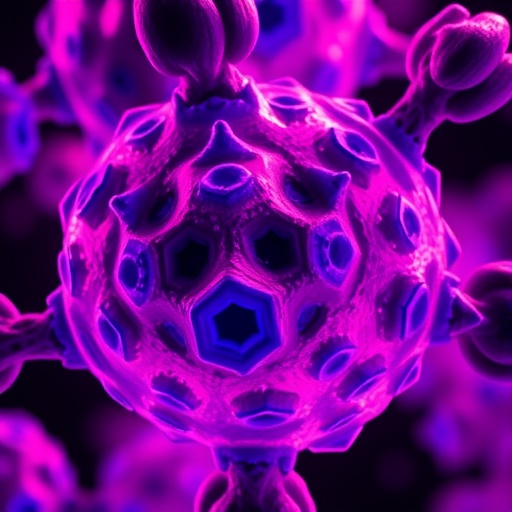In the relentless pursuit of effective cancer therapies, novel research has emerged, casting fresh light on the metabolic processes within tumors and their interactions with the immune system. A particularly compelling study by Dong, Yuan, Jin, and colleagues, titled “Lactate at the crossroads of tumor metabolism and immune escape: a new frontier in cancer therapy,” unfolds the pivotal role of lactate—a compound traditionally viewed primarily as a byproduct of anaerobic respiration—in shaping the tumor microenvironment. This intricate relationship between lactate production and immune evasion could redefine therapeutic targets in the fight against cancer.
Lactate, often associated with muscle fatigue during intense exercise, serves a dual function in the context of cancer. On one hand, tumors, especially as they grow and outstrip their oxygen supply, switch to anaerobic metabolism, generating lactate. On the other hand, this accumulation of lactate has far-reaching consequences, impacting both the metabolic landscape of tumors and the immune response to cancer. This research spotlights how lactate not only fuels tumor growth but also enhances mechanisms that allow cancer cells to escape immune detection and destruction.
The study delves into the metabolic reprogramming that cancer cells undergo to adapt to their hypoxic environment. As tumors expand, they exploit anaerobic glycolysis, leading to increased lactate production. This metabolic shift is emblematic of tumor adaptation, allowing for survival in conditions that would be detrimental to normal tissues. Through elevated levels of lactate, tumors can manipulate surrounding cells and the immune microenvironment, fostering conditions favorable for their growth and survival.
One striking revelation from the study is lactate’s role in modulating immune cell behavior. By influencing the signaling pathways within immune cells, particularly T cells and macrophages, lactate can promote an immunosuppressive state that enables tumors to escape immune surveillance. For instance, high concentrations of lactate have been shown to inhibit T cell proliferation and function, thereby dampening the body’s ability to mount a robust anti-tumor response. Such findings forge a connection between tumor metabolism and immune evasion, highlighting opportunities for therapeutically targeting this metabolic pathway.
Targeting lactate metabolism could pave the way for innovative cancer therapies. One proposed strategy involves lactate dehydrogenase (LDH), an enzyme crucial for lactate production. Inhibiting LDH may not only decrease lactate levels within the tumor microenvironment but also reinvigorate exhausted immune cells, allowing them to regain their capacity to fight cancer. This dual approach of targeting both the tumor and the immune response represents a promising frontier in creating more effective cancer treatments.
Furthermore, understanding how lactate influences the systemic immune response adds another layer of complexity to cancer immunotherapy. The study suggests that lactate may not only affect local immune responses but could also alter systemic immunity, potentially affecting patient outcomes. For example, lactate’s metabolic byproducts might interact with various immune cell populations, including dendritic cells and regulatory T cells, influencing how the body recognizes and engages tumors. These insights may help refine existing immunotherapies and guide the development of novel strategies aimed at overcoming immune escape mechanisms.
Additionally, the research highlights the necessity of integrating metabolic profiling into cancer treatment paradigms. By characterizing the metabolic landscape of tumors, clinicians may better predict therapy resistance and tailor more effective interventions. The convergence of metabolic and immune systems in cancer underscores the importance of a holistic approach, one that considers both metabolic vulnerabilities of tumors and the immune landscape surrounding them.
This study contributes to an expanding body of literature emphasizing the interconnectedness of metabolism and immune response. As researchers seek to unravel the complexities of tumor biology, the focus on lactate serves as a promising model for understanding the broader implications of metabolic alterations in cancer progression and therapy. Moving forward, the integration of metabolic constraints into immunotherapeutic approaches could unlock new avenues for treatment and improve clinical outcomes for patients battling various forms of cancer.
In conclusion, the implications of lactate in cancer metabolism and immunity spark a wave of potential clinical applications. The innovative strategies stemming from this research might not only refine existing therapies but also herald a new era of personalized cancer treatments that leverage metabolic dependencies and immune characteristics unique to individual tumors. As we stand on the brink of this new frontier in cancer therapy, the convergence of metabolic and immunological insights promises to transform our approach to overcoming cancer’s formidable defenses.
This compelling research underscores the importance of interdisciplinary approaches in cancer therapy. By bridging the gap between metabolic dysregulation and immune escape, scientists are shaping a more comprehensive understanding of tumor biology. As we move closer to clinical applications, the integration of lactate manipulation into therapeutic strategies could significantly impact patient care and therapeutic efficacy in the fight against cancer.
Subject of Research: Lactate’s role in tumor metabolism and immune escape.
Article Title: Lactate at the crossroads of tumor metabolism and immune escape: a new frontier in cancer therapy.
Article References:
Dong, Z., Yuan, Z., Jin, T. et al. Lactate at the crossroads of tumor metabolism and immune escape: a new frontier in cancer therapy. J Transl Med 23, 1239 (2025). https://doi.org/10.1186/s12967-025-07272-x
Image Credits: AI Generated
DOI: https://doi.org/10.1186/s12967-025-07272-x
Keywords: Lactate, tumor metabolism, immune escape, cancer therapy, immunotherapy.




